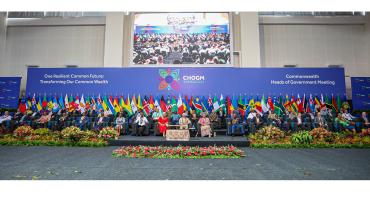Governments commit to promoting sport as a vital tool for sustainable development, and taking strong action to protect sports integrity

Governments from 32 Commonwealth countries today took the historic step of committing to align their national sports policies to the Sustainable Development Goals, in order to gear investments in sport towards positive outcomes in health, education, gender equality and justice.
At the Commonwealth Sports Ministers Meeting in Rio de Janeiro on 4 August – on the eve of the 2016 Summer Olympic Games – the governments also endorsed a set of far-reaching Commonwealth policy proposals to protect against threats such as doping, match fixing and other forms of corruption, while introducing safeguards to protect children, promote equality and end discrimination.
Commonwealth Secretary-General Patricia Scotland, opening the meeting, challenged Ministers to take bold steps to strengthen and scale national sports policy focused on advancing sustainable development, as she announced plans to launch a new initiative - Commonwealth Sport Integrity Champions - for high-achieving athletes and eminent individuals to mobilise action to ensure the long-term legitimacy and positive impact of sport.
“Commonwealth governments have made clear their determination to ensure that sport offers benefits not only for elite athletes but for the whole population, including disadvantaged communities and marginalised groups, such as people with disabilities. Sport is a part of our identity, a shared tradition and a common language. It can also improve the life chances of anyone who takes part: girls and boys, young and old, and people of all faiths and backgrounds, regardless of ability,” she said.
The Secretary-General added: “If countries do not deliver proper safeguards to protect the integrity of sport, the gains we hope to achieve by using sport as a tool for sustainable development will fail to materialise. That’s why it is so encouraging that Commonwealth governments are leading the way, globally, in their commitment to uphold the integrity of sport and their adoption of this Commonwealth consensus for action.”
The Ministers expressed strong concern about the seriousness of threats to the integrity of sport and agreed that sporting organisations and governments have a shared responsibility to act. They stressed that the full contribution of sport to sustainable development cannot be realised if threats to the integrity of sport undermine its legitimacy.
Australia’s Minister for Sport, Sussan Ley, who chaired the meeting, said: "The Commonwealth Sport Ministers Meeting is about the Commonwealth family coming together in the interests of peace, prosperity and diplomacy through sport. It provides an opportunity for us all to advance Commonwealth consensus and cooperation in key sports policy issues including strengthening the integrity of sport and achieving health outcomes. More broadly, the meeting serves to advance global efforts to improve sustainable development."
The policy proposals on integrity in sport endorsed by Ministers were presented by the Commonwealth Advisory Body on Sport, a group of independent experts, and relate to governance, safeguarding, manipulation of sports competition, equality and anti-doping.
An initiative announced by the Commonwealth Secretary-General, Commonwealth Sport Integrity Champions, will see role models in the worlds of sport and national leadership selected to raise public awareness and understanding of the importance of safeguarding integrity, and help to mobilise programmes to ensure that sport makes a positive contribution to local communities.
The recommendations were welcomed by attendees, which, in addition to governments, included representatives from organisations including the Commonwealth Games Federation, World Health Organization, UNESCO, Transparency International, the International Olympics Committee and the International Paralympics Committee, and the World Anti-Doping Agency.
Blogs
- Sports Minister: Health and sport are best mates in Australia by The Hon Sussan Ley MP, Australian Minister for Health and Aged Care and Minister for Sport
- Commonwealth Games from a sporting games to a sporting movement for all communities by David Grevemberg CBE, Chief Executive, Commonwealth Games Federation
- More than just a game: Sport and the Sustainable Development Goals by Commonwealth Deputy Secretary-General Deodat Maharaj
- Time to move from ‘declaration to action’ on sport policy by Alexander Schischlik, Chief of Section - Youth and Sport, UNESCO
Notes to Editors:
- The Commonwealth is a voluntary association of 53 independent and equal sovereign states. It is home to 2.2 billion citizens, of which over 60% are under the age of 30.
- The Commonwealth Secretariat advocates for sport to be used as a vehicle for peace and development. We assist member countries to develop policies and frameworks that link sport to outcomes in areas such as health, education, gender equality and social cohesion.
- Our policy guidance and analysis demonstrates how sport can be utilised to contribute to development outcomes. Recent guidance includes a report on the potential for sport in the 2030 Agenda for Sustainable Development.
- Countries in attendance were: Australia, The Bahamas, Barbados, Belize, Brunei Darussalam, Botswana, Cameroon, Canada, Cyprus, India, Jamaica, Kenya, Kiribati, Lesotho, Malawi, Malaysia, Malta, Mozambique, Namibia, New Zealand, Nigeria, Papua New Guinea, Rwanda, Samoa, Seychelles, Sierra Leone, Singapore, South Africa, Sri Lanka, United Kingdom, and Zambia.
Downloads:
- Read the Ministers' Joint CommuniqueDocument
- Sport for Development and Peace and the 2030 Agenda for Sustainable Development
- Policy Guidance to Commonwealth Governments on Protecting the Integrity of Sport
- Download images



